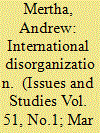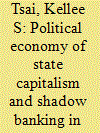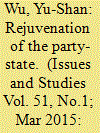|
|
|
Sort Order |
|
|
|
Items / Page
|
|
|
|
|
|
|
| Srl | Item |
| 1 |
ID:
138150


|
|
|
| 2 |
ID:
138154


|
|
|
|
|
| Summary/Abstract |
Observers of China take for granted that Chinese domestic politics are highly fragmented. At the same time, they tend to relax these assumptions when analyzing China as an international actor. The thesis of this article is that domestic institutional fragmentation in Chinese bureaucratic politics carries over into its international behavior. Using the historical case of Chinese foreign assistance to Democratic Kampuchea, this article demonstrates that the effectiveness of Chinese foreign aid—and the influence that comes with it—is only as good as the domestic institutions that manage the bilateral relationship. This has implications for understanding the veracity of Chinese global influence today as well as refocusing attention to the domestic constraints on Beijing’s international behavior.
|
|
|
|
|
|
|
|
|
|
|
|
|
|
|
|
| 3 |
ID:
138152


|
|
|
|
|
| Summary/Abstract |
The Xi-Li administration faces the dual challenge of managing state capitalism and shadow banking as China enters a phase of more moderate economic growth. During China’s first three decades of reform, private sector development occurred in parallel with prioritization of state-owned enterprises in strategic industries, and growth surged. This pattern of state capitalism rested on an unarticulated bifurcated financing arrangement whereby the formal banking system primarily served public enterprises, while private businesses relied primarily on informal finance. However, China’s response to global financial crisis disrupted the preceding equilibrium of financial dualism under state capitalism. Unprecedented expansion of bank lending after 2008 created opportunities for a host of state economic actors—including SOEs, state banks, and local governments—to expand their participation in off-balance sheet activities.
|
|
|
|
|
|
|
|
|
|
|
|
|
|
|
|
| 4 |
ID:
138151


|
|
|
|
|
| Summary/Abstract |
Xi Jinping’s economic reforms should be seen as a response to the situation bequeathed to him by the previous Hu-Wen administration. On balance, Hu-Wen achieved little with respect to economic reforms and in some ways went backwards. This reform retreat was accompanied by a substantial increase in the power of bureaucratic agencies such as the National Development and Reform Commission and the State Assets Supervisions and Administration Commission. Xi Jinping’s reforms can be seen both as an effort to overcome the crisis of confidence about economic reform that became pervasive in China over the past decade, and an effort to shake up entrenched bureaucracies that may have begun to block reforms. Xi’s initiatives are thus more radical when viewed from the standpoint of politics and economics together, than when just seen as economic policies. However, the overall logic of Xi’s policies has still not emerged clearly.
|
|
|
|
|
|
|
|
|
|
|
|
|
|
|
|
| 5 |
ID:
138153


|
|
|
|
|
| Summary/Abstract |
It is widely recognized that the political system in the PRC is more institutionalized and predictable than in the past, and that its regular rejuvenation is a source of strength. While not denying the virtues of the age-based system, this paper argues that there are limits on the forced rejuvenation scheme. It looks at how cadres on the CCP’s Central Committee are excluded from competing for the top leadership positions because of their age. Four groups of elite are identified, T2 (zongshuji, zongli), SCP-T2 (changwei), PB-SCP (juwei), and CC-PB (zhongwei), and their frustration over exclusion from competing for the T2 positions in the next major leadership turnover (next even-numbered Party Congress) measured (Exclusion and Frustration Rate, EFR). An overall score is also calculated to measure the total frustration with the system (Total Exclusion and Frustration, TEF). It is shown that the EFR and TEF are extremely high, and tension is bound to accumulate in the system. Finally, the Bo Xilai (薄熙來) case is explored to demonstrate how aspiring cadres may be discriminated against by the system and thus inclined to rebel against it. It is advised that instead of simply accepting the system as it stands and calculating how personnel decisions will be churned out, more attention should be given to its limits and sustainability in the long term.
|
|
|
|
|
|
|
|
|
|
|
|
|
|
|
|
| 6 |
ID:
138155


|
|
|
|
|
| Summary/Abstract |
In 2002, Hu Jintao introduced his concept of a harmonious society (和 諧社會) in which he introduced the concept of putting people first (以 人為本), a guiding principle for many of the policies to come, including new resettlement regulations governing water resources and hydropower projects published in 2006. Drawing on fieldwork conducted in resettlement communities along the Lancang River in Yunnan province, this article analyzes the manner in which the local government manages the implementation of a more socially-oriented resettlement policy. While formerly local cadres tended to use force in order to fulfill policy requirements demanded from above, in line with new upper-level requirements, local governments have begun to devise a variety of strategies including soft coercion, negotiation, and propaganda work to implement resettlement policies, thereby providing evidence of a softer type of authoritarianism at the grassroots level
|
|
|
|
|
|
|
|
|
|
|
|
|
|
|
|
|
|
|
|
|